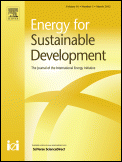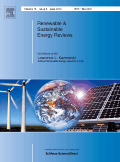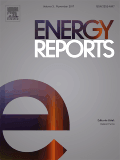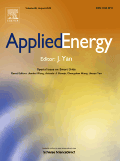
Energy for Sustainable Development
Scope & Guideline
Fostering collaboration at the nexus of energy and sustainability.
Introduction
Aims and Scopes
- Sustainable Energy Solutions:
The journal emphasizes research on renewable energy sources, including solar, wind, and bioenergy, and their deployment in various socioeconomic contexts. - Energy Policy and Governance:
It addresses the implications of energy policies, governance structures, and regulatory frameworks that influence energy access, equity, and sustainability. - Technological Innovations:
The journal publishes studies on technological advancements in energy systems, including energy storage, smart grids, and energy efficiency technologies. - Socioeconomic Impacts:
Research on the social dimensions of energy access, including the impact of energy poverty on communities and strategies for inclusive energy transitions. - Environmental Sustainability:
The journal explores the environmental implications of energy production and consumption, focusing on life cycle assessments, emissions reductions, and ecological impacts. - Community and Localized Energy Solutions:
It highlights research on community-based energy initiatives, decentralized energy systems, and local governance models for sustainable energy development.
Trending and Emerging
- Decentralized Energy Systems:
There is a growing focus on decentralized energy solutions, including microgrids and community solar projects, which empower local populations and enhance energy access. - Energy Justice and Equity:
Research on energy justice and equity has gained prominence, addressing how energy transitions can address inequalities and ensure fair access to energy resources. - Integration of Renewable Energy Technologies:
The integration of various renewable energy technologies, such as solar, wind, and bioenergy, into hybrid systems is increasingly being explored to enhance resilience and sustainability. - Climate Change Mitigation Strategies:
There is heightened interest in strategies for mitigating climate change through energy transitions, including carbon capture technology and net-zero pathways. - Behavioral and Social Aspects of Energy Use:
Studies focusing on the behavioral and social dimensions of energy consumption, including user preferences and community engagement in energy transitions, are emerging as important themes. - Innovative Financing Mechanisms:
Research on innovative financing models for renewable energy projects, including public-private partnerships and crowd-funding, is trending as a means to accelerate energy transitions.
Declining or Waning
- Coal and Fossil Fuel Research:
There has been a noticeable decline in research focused on coal and fossil fuels, reflecting a global shift towards renewable energy solutions and the phasing out of coal-based energy systems. - Traditional Energy Efficiency Measures:
Studies centered solely on conventional energy efficiency measures without integrating innovative technologies or renewable energy sources have decreased, indicating a transition towards more holistic approaches. - Nuclear Energy Discussions:
The discourse around nuclear energy, once a significant theme within energy research, appears to be waning as the focus shifts more towards renewables and sustainable alternatives. - Large-Scale Hydropower Projects:
Research on large-scale hydropower projects has decreased, possibly due to increasing awareness of their environmental impacts and the push for smaller, community-based energy solutions. - Generalized Energy Market Analyses:
The journal has moved away from broad analyses of energy markets towards more focused studies that address specific technologies or localized energy solutions.
Similar Journals

Advances in Energy Research
Transforming Energy Research into Sustainable Practices.Advances in Energy Research is a prominent journal dedicated to the exploration and advancement of energy technologies and sustainable practices. Published by TECHNO-PRESS, this journal serves as a vital platform for researchers, professionals, and students in the energy field, featuring innovative studies and reviews that contribute to the body of knowledge surrounding energy efficiency, renewable resources, and the integration of new technologies. The journal holds a significant position in energy research and aims to facilitate the dissemination of groundbreaking findings and ideas that are pivotal for the transition toward a more sustainable energy future. Located in South Korea, with an ISSN of 2287-6316, it embraces an open access philosophy that ensures widespread availability of its content, further enhancing its impact in the academic community.

INTERNATIONAL JOURNAL OF GLOBAL ENERGY ISSUES
Advancing Dialogue on Renewable and Nuclear EnergyThe INTERNATIONAL JOURNAL OF GLOBAL ENERGY ISSUES, published by INDERSCIENCE ENTERPRISES LTD, stands as a vital platform for disseminating innovative research in the fields of energy engineering, nuclear energy, and renewable sustainability. With ISSN 0954-7118 and E-ISSN 1741-5128, this journal has been catering to the energy sector since 1989, advancing scholarly dialogue through critical analyses and discussions of emerging energy technologies and policies. Though currently categorized in the fourth quartile across various energy-related disciplines, the journal aims to bridge knowledge gaps and offer insights that challenge the status quo. Operating from its headquarters in the United Kingdom and accessible to a global audience, the journal encourages submissions that drive interdisciplinary research and provide solutions for pressing global energy challenges. Researchers, professionals, and students alike are invited to contribute and engage with this prestigious journal to influence the future of energy practices.

RENEWABLE & SUSTAINABLE ENERGY REVIEWS
Illuminating Pathways to a Greener FutureRENEWABLE & SUSTAINABLE ENERGY REVIEWS is a premier interdisciplinary journal published by Pergamon-Elsevier Science Ltd that focuses on cutting-edge research and reviews in the field of renewable energy and sustainability. With an esteemed impact factor, the journal stands out in Q1 category rankings for Renewable Energy, Sustainability, and the Environment, holding a remarkable rank of #7 out of 270 in Scopus with a 97th percentile rating. Since its inception in 1997, it has provided a vital platform for scholars and practitioners to disseminate knowledge, share innovative solutions, and discuss the technological advancements needed to foster a sustainable energy future. Although not currently offering open access, the journal ensures valuable insights are available to its audience, contributing enormously to the global discourse on renewable energy policy and practice. The journal is vital for anyone interested in the dynamics of sustainability in energy systems, as it bridges the gap between academia and practical application.

INTERNATIONAL JOURNAL OF ENERGY RESEARCH
Shaping the future of energy through collaborative insights.INTERNATIONAL JOURNAL OF ENERGY RESEARCH (ISSN: 0363-907X; E-ISSN: 1099-114X), published by Wiley-Hindawi, stands at the forefront of energy research, offering a scholarly platform pivotal for advancing knowledge in the fields of energy engineering, nuclear energy, fuel technology, and renewable energy systems. With an impressive Q1 and Q2 ranking across several categories as of 2023, this journal reflects a commitment to high-quality, peer-reviewed research that addresses both theoretical and practical challenges in the energy sector. Now an Open Access journal since 2023, it enhances accessibility and dissemination of cutting-edge research to a global audience. Located in the United Kingdom, with an active publication history dating back to 1977, the journal aims to contribute to sustainable energy solutions and innovative technologies. Researchers, professionals, and scholars will find valuable insights and discussions here, bridging gaps in energy research and policy-making.

MRS Energy & Sustainability
Fostering Interdisciplinary Insights for a Sustainable WorldMRS Energy & Sustainability is a premier interdisciplinary journal published by SpringerNature, focusing on advancing the understanding of energy systems and sustainability within the context of materials science and engineering. Since its inception in 2014, this journal has rapidly gained recognition in the academic landscape, achieving impressive rankings including Q1 in Electronic, Optical and Magnetic Materials and Mechanics of Materials, and Q2 in Energy Engineering and Power Technology as well as Renewable Energy, Sustainability and the Environment, as of 2023. The journal's ISSN is 2329-2229 and E-ISSN is 2329-2237. With a commitment to open access, it provides researchers and professionals with the latest findings and insights essential for guiding innovations in energy solutions and sustainable practices. The journal's global reach and high-impact reputation make it an invaluable resource for scientists, engineers, and policymakers dedicated to addressing the contemporary challenges of energy and sustainability. With a diverse scope and high Scopus rankings, MRS Energy & Sustainability continues to be at the forefront of research that shapes our energy future.

Progress in Energy
Transforming Energy Research into Real-World SolutionsProgress in Energy, published by IOP Publishing Ltd, is an esteemed open-access journal that focuses on cutting-edge research in the field of energy. With its e-ISSN 2516-1083, this journal stands out for its commitment to disseminating high-quality articles that aim to advance the understanding and application of energy technologies and policies. Juggling respectably in the academic arena, it proudly holds a Q1 classification in the energy (miscellaneous) category and ranks 6th out of 73 in the general energy sector, placing it in the top 92nd percentile among its peers, according to Scopus metrics. The journal's scope encompasses a wide range of topics, including renewable energy, energy efficiency, and policy analysis, making it a vital resource for researchers, industry professionals, and students alike. With a publication horizon extending from 2019 to 2024, Progress in Energy invites contributions that push the boundaries of knowledge in energy fundamentals and innovations.

Energy Reports
Innovative Insights into the Future of Energy ResearchEnergy Reports, published by Elsevier, is a prestigious open access journal that serves as a vital resource in the field of energy research. Since its inception in 2015, this journal has swiftly ascended to become a key player in disseminating knowledge across various energy-related disciplines, evident from its impressive Q2 ranking in the miscellaneous category of Energy for 2023 and its notable position in the 78th percentile among over 70 journals in the general energy category, ranked 16th out of 73 on Scopus. Based in the United Kingdom, Energy Reports not only fosters innovative research but also promotes accessibility by providing open access to its articles, thereby ensuring that findings reach a global audience of researchers, professionals, and students. With a commitment to advancing sustainable energy solutions and technologies, Energy Reports plays a crucial role in shaping future energy policies and practices, making it an essential platform for scholarly communication in the ever-evolving landscape of energy research.

Energy Science & Engineering
Advancing Innovation in Energy Science and EngineeringEnergy Science & Engineering, published by WILEY, serves as a leading open-access platform for the dissemination of high-quality research and insights in the fields of energy science, engineering, and safety. Since its inception in 2013, this esteemed journal has gained recognition for its impactful contributions, reflected in its impressive impact factor and notable Scopus rankings. As of 2023, it holds a distinguished Q2 category ranking in both Energy (miscellaneous) and Safety, Risk, Reliability, and Quality, showcasing its vital role in advancing interdisciplinary collaboration and innovation. With an open access model, the journal ensures that groundbreaking research reaches a wide audience, fostering discussion and knowledge sharing across academia and industry. The scope of the journal encompasses cutting-edge topics related to energy efficiency, renewable energy technologies, and risk management, making it an essential resource for researchers, professionals, and students aiming to contribute to the evolving landscape of energy science and enhance societal sustainability.

APPLIED ENERGY
Illuminating pathways to efficient energy practices.APPLIED ENERGY, published by Elsevier Science Ltd, is a leading journal dedicated to the advancing field of energy research, focusing on practical engineering solutions to contemporary challenges in energy management, sustainability, and environmental impact. With a rigorous peer-review process and a strong commitment to promoting innovative research, APPLIED ENERGY proudly holds multiple Q1 rankings across various categories, including Building and Construction, Civil and Structural Engineering, and Renewable Energy, reflecting its prestigious position within the academic community. Researchers and professionals can benefit from its comprehensive scope, covering topics that span from policy and technology to market dynamics. Although it is not an open-access journal, it provides access options that facilitate research dissemination. With its historical significance since 1975 and an ambitious outlook up to 2025, APPLIED ENERGY continues to be an essential resource for anyone looking to stay at the forefront of energy research and application.

Problemele Energeticii Regionale
Empowering Energy Solutions for TomorrowProblemele Energeticii Regionale is a notable academic journal focused on the field of energy engineering and sustainable energy solutions, published by the Institute of Power Engineering, Academy of Sciences of Moldova. Since its inception in 2005, this Open Access journal has become a significant platform for disseminating research and innovations in various energy-related domains, including renewable solutions, fuel technology, and energy sustainability. While its impact factor metrics suggest it currently resides in the Q4 quartile category across multiple scopes—such as Energy Engineering, Power Technology, and Renewable Energy—it provides critical insights that can pave the way for advancements in regional energy challenges. Researchers, professionals, and students alike will find this journal an essential resource for understanding and contributing to the ongoing discourse in the energy sector. With its commitment to accessibility and knowledge sharing, Problemele Energeticii Regionale aims to foster a collaborative and informed community focused on energy innovation and sustainability.